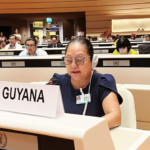
In a scorching review of Guyana’s Low Carbon Development Strategy (LCDS) 2030, local non-governmental group, Policy Forum Guyana, believes that in rolling out the strategy, the Government appears more concerned with making money, than reducing greenhouse gas emissions.
In a statement, the group made known its concerns in wake of recent statements from the Vice President and other Government officials about th strategy.
“Money-making rather than reducing global warming dominates the breezy but opaque text of the LCDS 2030 document,” the non-governmental apolitical organisation said in a statement over the weekend.
According to LCDS 2030, Guyana intends to harness the value of the country’s ecosystem services by building a long-term, low- carbon diversification opportunity. But Policy Forum Guyana is convinced that LCDS 2030, in its current form, defeats the intended purpose of low carbon strategies.
“From a pioneering REDD+ Agreement with Norway a decade ago, Guyana’s forests are now being re-packaged as an ‘eco-system service’ in the Low Carbon Development Strategy (LCDS) 2030 in which the world’s leading fossil fuel generating companies are encouraged to invest. Buying credits is a device for companies to avoid reducing their fossil fuel emissions. To this extent, the re-vamped LCDS undermines the essential purpose of low carbon strategies namely reduction in fossil fuel emissions,” Policy Forum Guyana reasoned.
The Policy Forum group said reputable international studies have concluded that 90% of the projects invested in by the carbon credit market are ‘worthless’, neither strengthening forest capacity to capture emissions nor expanding emissions captures.
Policy Forum Guyana said the copious references to the UN Framework Convention Commission Climate Change (UNFCC) are only intended to add “respectability,” however, the primary focus remains making money.
Further, Policy Forum Guyana contended that LCDS 2030 is also a threat to Indigenous life.
“The Government will have no difficulty finding indigenous voices to shut down these views, given the decades of integration propaganda. However, if our criticism is groundless, why does the launching of the LCDS coincide with a campaign by Government representatives denouncing indigenous activists and undermining their organizations?” the Policy Forum Guyana asked.
It said a more constructive response which would be widely welcomed, should include relevant oversight mechanisms, namely the Office of Climate Change, the Natural Resources Fund and the Guyana Forestry Commission to address the immense wealth to be generated from oil.
It questioned why Guyana needs a fire-sale of its natural resources – minerals, rivers, bio-diversity, beaches, and wildlife – when immense wealth is to be generated from the Oil and Gas Industry.
“What is the legality of the Government commercializing publicly-owned assets of which the State is only the Trustee, not the owner (Doctrine of Public Trust)? Indigenous communities were recognized as owners of forests on community lands under the REDD+ scheme and payments were to be proportionate to deferred de-forestation. Why was this changed? Why is the Government by-passing the requirement in the Amerindian Act for the explicit agreement by two-thirds of the villagers in every village that holds titled land to agree to any decision regarding the disposal of their titled land? What is the justification of communities receiving 15% of the HESS purchase? By what authority is the Government determining how the communities should spend this money?”
Those were among questions posed by the organisation.
Policy Forum pointed out that the Grantham Institute, which is a leading climate research group, in a just released study, said LCDS 2030 should aim for radical emissions cuts.











You must be logged in to post a comment Login